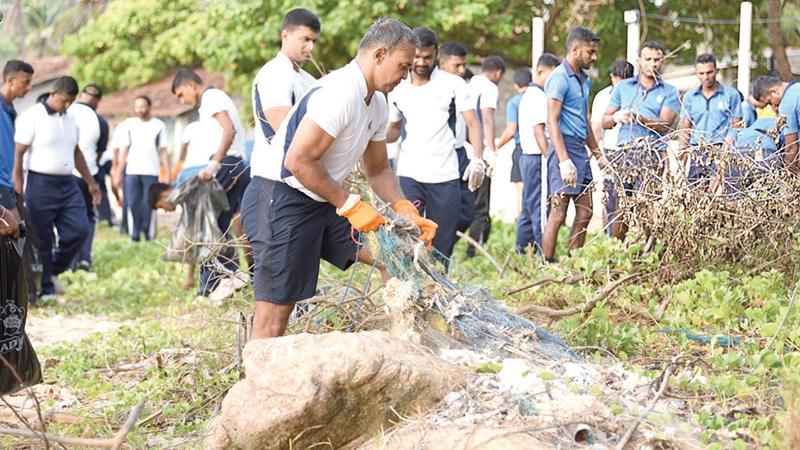
The Naval Dockyard in Trincomalee was declared a Domain of Green and Blue on Friday by the Commander of the Navy, Vice Admiral Piyal De Silva, as an environmental protection pilot project – “Neela Haritha Sangramaya”.
Trincomalee Naval Dockyard receiving a large number of local as well as foreign visitors and home to over 9,000 naval and civil personnel spans over 850 acres covered by vegetation and surrounded by deep blue ocean. A large number of initiatives, including mangrove plantation, turtle conservation, tree plantation, beach cleaning, public awareness programs, coral re-plantation and conservation, energy conservation, solar power projects, water conservation, bio gas projects, waste water management, recycling of plastic and polythene, conservation of wild animals, rain water harvesting projects, sewage treatment projects, paper recycling projects, creating paper free office premises and encouraging community for legal fishing practices were set in motion on Friday, to develop the Dockyard as a model to motivate the general public towards a favourable attitude on environment conservation.
Meanwhile, to enhance the quality and performance of urban services, such as energy, transportation and utilities to reduce resource consumption, wastage and overall costs, the Smart City concept has been introduced to the Naval Dockyard. As such, eco-friendly and practical programs, such as smart card for entrance and exit of people and vehicles at the main gate, solar powered street lamps, solar vehicles, digital boards for instruction and announcements, using internet for monthly reports, use of bicycles for internal short distance commuting are scheduled to be introduced.
The Navy had recognised the threefold environmental threat to the marine and coastal resources of the country: pollution from both land and sea-based sources, which causes direct damage to specialised ecosystem, such as mangroves, coral reefs and sea grasses whilst weakening the ability of marine plant and animals to survive; the direct threat to biomass and ecological balance of the marine environment through over fishing and unsustainable extraction of resources; and the direct physical damage to coastal and marine ecosystem from urban development activities.
Sri Lanka Navy being the ideal organisation to address such issues having the unique character, resources and capabilities has decided to undertake a special project with the aim to establish a sustainable environment.
